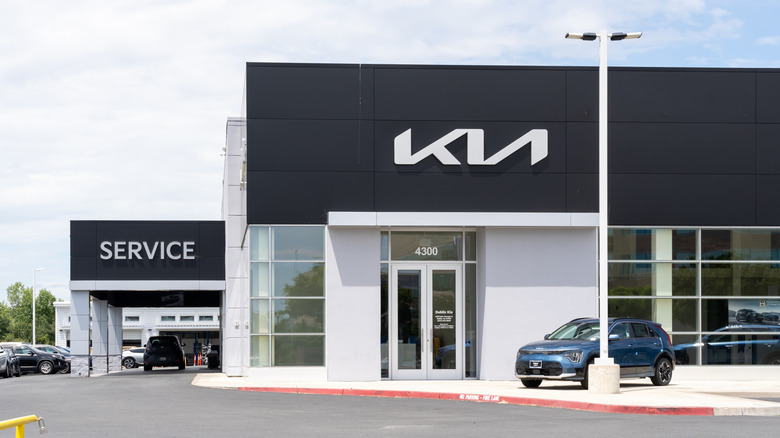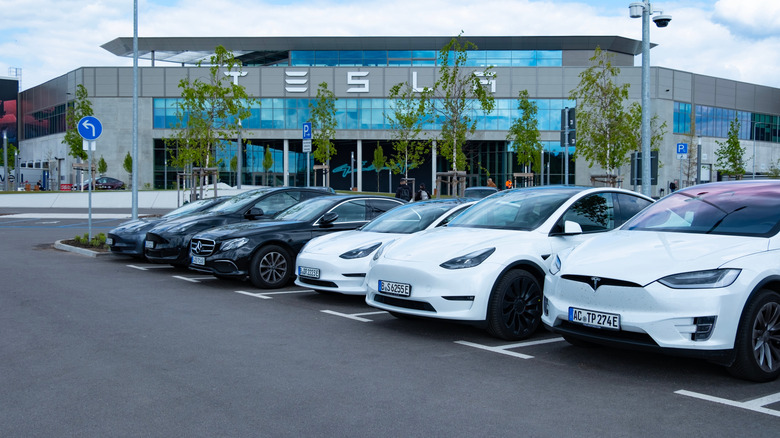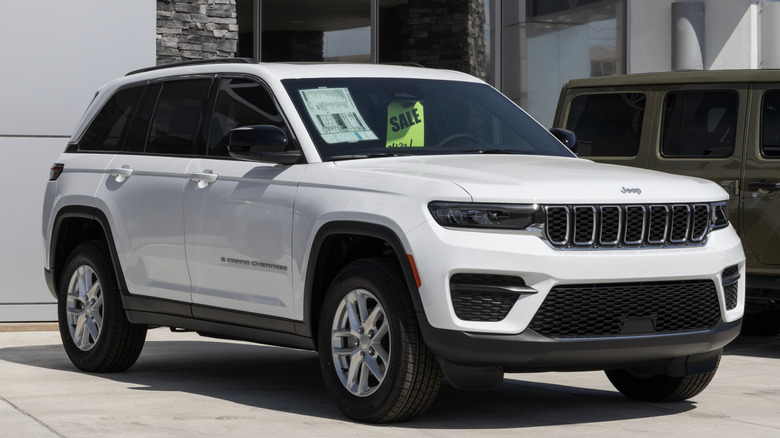Good morning! It’s Friday, July 25, 2025, and this is The Morning Shift, your daily roundup of the top automotive headlines from around the world, in one place. This is where you’ll find the most important stories that are shaping the way Americans drive and get around.
In this morning’s edition, Volkswagens grapples with a massive tariff hit, Kia looks to take advantage of the situation President Trump created, Tesla faces another setback in Europe and Jeep is recalling over 120,000 Grand Cherokees.
It’s gonna be a busy day. Let’s get started.
1st Gear: Volkswagen is struggling with tariff costs
It’s not a good time to be a Volkswagen bean counter right now. The German automaker just reported a $1.5 billion first-half hit due to Donald Trump’s ill-advised tariff war. It also cut its full-year sales and profit margin forecasts just to add insult to injury.
Europe’s biggest automaker now expects this year’s operating profit margin to fall somewhere between 4% and 5% — down from the 5.5-6.5% that it previously forecasted. It also expects sales to remain flat compared with last year rather than rising by up to 5%. Ouch. Of course, it’s not just tariffs that have done this. Stiffening competition from China and a slower-than-expected adoption of EVs aren’t helping matters.
Volkswagen reported an operating profit of about $4.6 billion in the second quarter — down a whopping 29% from the previous year. That number comes despite the fact that VW was able to boost global deliveries by 1.5% in the first half of the year — even though it saw a nearly 10% decline in U.S. deliveries. From Reuters:
CEO Oliver Blume told investors the company must intensify its cost-cutting efforts in response to the tariffs.
“We need to shift our cost efforts into high gear and accelerate implementation. After all, we cannot assume that the tariff situation is only temporary,” Blume said.
I know this will come as a shock, but VW and its European competition have been pressing hard for European trade negotiations to come up with a deal to reduce the 25% tariff they have been dealing with since April.
EU diplomats have indicated that the bloc could be moving towards a broad 15% tariff as it seeks to avoid a 30% levy from August 1. A deal struck between the U.S. and Japan earlier this week raised hopes for a similar agreement for Europe, boosting carmakers’ shares.
Volkswagen finance chief Arno Antlitz said the company’s profit margin would roughly land in the middle of its guidance with a Japan-style deal, which had a 15% tariff rate.
He warned, however, that the clock was ticking on finding a deal. “We are already in July, so the longer we go into the second half of the year, the more we tend to the lower end of the guidance,” he said.
As of right now, VW will not say if the automaker will raise prices to help offset some of the tariff charges it’s incurring. I don’t want to speak for the company, but I’ve got a sneaking suspicion that it won’t keep eating these huge losses forever.
2nd Gear: Kia wants to use tariffs to its advantage
Kia is looking to capitalize on the struggles of its competitors as Trump’s tariffs ravage the auto industry. The South Korean automaker says it aims to increase its U.S. sales and market share in the second half of this year by keeping prices down as other rivals look to raise theirs.
Kia said its operating profit in the second quarter of this year slumped considerably as it took on a $570 million hit thanks to U.S. tariffs. It warned that a bigger blow is coming in the second half of this year. Still, it was able to increase Q2 sales by 5% as consumers rushed to buy vehicles before tariffs increased prices. It expects even bigger things in the second half of the year. From Reuters:
It said it aimed to increase its U.S. sales by 7% to 8% in the second half of the year even as overall auto sales in the U.S. market are expected to slump by 10%, leading to a gain in market share to over 6% from 5.1% in the first half.
It expects Carnival and K4 small car sales to drive the gains while some Japanese automakers are raising prices.
While Kia and Hyundai import about two-thirds sold in the U.S. market, making them more exposed to U.S. tariffs than major rivals, Kia said on Friday that it has not yet made detailed plans to raise prices, instead focusing on growing its U.S. business.
“We believe that we will be able to use the difficult environment as a good opportunity to level up (our market share and sales), and that’s Kia’s strength,” Kia chief financial officer Kim Seung-jun said during a conference call.
To lessen the impact of tariffs, Kia’s South Korean factories are going to divert some of their shipments from the U.S. to other markets like Canada.
In an effort to give customers what they really want, Kia is set to shuffle production at its plant in Georgia. It’ll now prioritize vehicles like the Sportage, Sorento and Telluride — shifting its EV production elsewhere.
3rd Gear: Tesla can’t catch a break in Europe
Tesla has been having a very bad 2025 in Europe, and it just hit another roadblock. The company’s efforts to mitigate slumping sales on the continent with gains in Turkey — one of Tesla’s fastest-growing markets — are having major issues, as it just got hit with a surprise tax hike. From Bloomberg:
Turkey has raised the lowest tier of its special consumption tax for electric vehicles — which includes Tesla’s top-selling Model Y — to 25% from 10%, according to a presidential decree published in the country’s Official Gazette.
The move adds to challenges facing Tesla CEO Elon Musk, who warned of difficult quarters over the next year or more as the company contends with the phase-out of US EV subsidies and slow progress in autonomous vehicle development.
Turkey has emerged as an increasingly significant market for Tesla, helping alleviate falling demand elsewhere in Europe. Musk name-checked the country during the company’s quarterly earnings call Wednesday.
Tesla sales in the country soared 171% in June to 7,235 units, with the Model Y taking the top spot among EVs. In same month, Tesla registrations across Europe dropped 23% to 34,781 vehicles, according to data published Thursday by the European Automobile Manufacturers’ Association.
Tesla’s success in Europe has been supported by a local market-specific version of the Model Y that is designed to qualify for a lower tax bracket. Until now, Turkish customers could buy the electric crossover for the equivalent of $46,100 — under the 10% tax rate. Unfortunately for everyone involved, the new levy could push prices up by about $6,000.
It’s not just Tesla that will feel the heat, either. BYD, Volkswagen, Hyundai and Stellantis could all face serious issues in Turkey because of the new tax.
4th Gear: Headrest issue leads to Jeep recalling 120,000 Grand Cherokees
Making cars is really hard, and few automakers prove that theory better than Stellantis. The automaker says it is recalling 121,398 2023 and 2024 Jeep Grand Cherokees and Grand Cherokee Ls because the second-row headrests might not lock into the upright position. I don’t have to tell you why that’s bad — because you’re really smart — but let’s just say it can increase the risk of a serious injury in serious types of crashes, according to the National Highway Traffic Safety Administration. From Automotive News:
Only 1 percent of recalled vehicles are expected to have the defect, NHTSA said in a July 17 report. Vehicles with the defect were produced from May 16, 2023, to Jan. 30, 2024.
In affected vehicles, the second-row head restraints were built with an internal locking mechanism with an interference condition that may prevent the headrest from locking upright, NHTSA said.
Owners of impacted vehicles can visit a dealer to have the head restraint inspected and potentially replaced, NHTSA said. Dealers will be notified July 24 and owners will be notified Sept. 5.
Luckily, it doesn’t seem like there have been any injuries or deaths related to the defect, but it’s always better to be safe than sorry.
Reverse: Why would Timothée do this?
I love the idea of a bunch of folk music-loving hippies absolutely losing their minds at Bob Dylan daring to try something new. If you want to read more about it, head over to History.com.
On the radio: Noisestorm – Crab Rave
Who would have thought Jalopnik would outlive Hulk Hogan?







